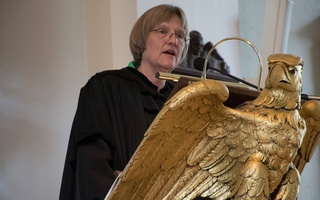The Cambridge City Council unanimously adopted a policy order supporting the Temporary Protected Status visa program at a meeting Monday.
The TPS program, which Congress established in 1990, grants temporary protections to immigrants from countries experiencing natural disasters or armed conflicts, allowing them to legally live and work in the United States. The Trump administration recently announced plans to revoke TPS for immigrants from Nicaragua, El Salvador, Haiti, and Sudan. Protections for immigrants from Honduras, Yemen, Somalia, and Nepal will end later this year.
Following the release of new federal immigration policies, 19 state attorneys general endorsed a letter urging Congress to grant permanent legal status to immigrants at risk of losing TPS.
The City Council’s policy order—which all nine councillors approved—asserts the city’s support for the letter to Congress, noting that the City of Cambridge has long been “a proud supporter of immigrants.”
In an interview, Manny E. Lusardi, the mayor’s liaison for immigrant affairs, pointed to Cambridge’s history of immigrant-supporting policies, which include free monthly legal consultations for immigrants and the city’s immigration legal defense fund.
Lusardi, who wrote the order, emphasized the importance of these local programs in the face of federal policies targeting immigrants.
“Immigration is local,” he said. “We’re trying to prove that by leading other people in the community and asking them, by example, to step up to do similar programs.”
Mayor Marc C. McGovern, who sponsored the order, said the legislation was an important step towards protecting immigrants in Cambridge.
“I think it’s just another example of our stating our values, and pushing back against the presidential administration we feel is attacking immigrants in our community,” McGovern said.
McGovern also called for the city to surpass its previous commitments to immigrants, saying he thought anti-immigrant sentiment still exists in Massachusetts, despite its “blue” tilt.
“Cambridge has been a sanctuary city since the mid-80s. Crime is at a 60-year low,” he said. “It is not undocumented immigrants that are committing crimes in Cambridge, but folks don’t want to believe the data. There’s so much prejudice and racism, even here in Massachusetts.”
At the meeting, Councillor Quinton Zondervan voiced concerns about TPS recipients losing their driver’s licenses. According to immigrant advocacy groups, TPS immigrants without licenses will be vulnerable to arrest, since driving after they lose their protected status is prohibited.
“I’m particularly concerned, in this case, because we are changing our driver’s license requirements, which will severely impact immigrants who are losing their Temporary Protected Status,” Zondervan said.
According to McGovern, while Monday’s policy order does not address specific policy issues, it does have “symbolic” value.
“I want people to have a path towards citizenship that is reasonable that doesn’t take years and years,” he said. “I’d like to see them become citizens. They basically are.”
—Staff writer Iris M. Lewis can be reached at iris.lewis@thecrimson.com.
—Staff writer Patricia J. Liu can be reached at patricia.liu@thecrimson.com.
Read more in News
HKS Receives $2.5 Million for Economic Inequality ResearchRecommended Articles
-
 GSAS Students Seek to Publicize Immigration Resources
GSAS Students Seek to Publicize Immigration Resources -
Trump’s TPS Changes Could Affect Dozens at HarvardDozens of Harvard affiliates remain uncertain about their futures after government officials announced changes to the Temporary Protected Status program this month.
-
 Faust Pens Letter Urging Congress to Protect TPS Holders
Faust Pens Letter Urging Congress to Protect TPS Holders -
TPS Recipients Ask for Increased Legal SupportPresident Donald Trump’s recent repeal of Temporary Protected Status has led some student activists and TPS recipients to argue that the University should hire more staff for the Harvard Immigration and Refugee Clinic.
-
 Workers, Activists Discuss Impact of TPS on Unions
Workers, Activists Discuss Impact of TPS on Unions













